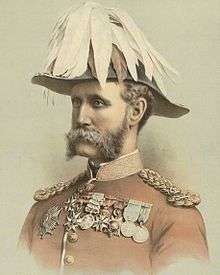George Willis (British Army officer)
| Sir George Willis | |
|---|---|
 Sir George Willis | |
| Born |
11 November 1823 Sopley, Hampshire, England |
| Died |
29 November 1900 (aged 77) Bournemouth, Hampshire, England |
| Allegiance |
|
| Service/branch |
|
| Years of service | 1841–1890 |
| Rank | General |
| Commands held | Northern District |
| Battles/wars |
Crimean War Egyptian Expedition |
| Awards | Knight Grand Cross of the Order of the Bath |
General Sir George Harry Smith Willis GCB (11 November 1823 – 29 November 1900) was a British Army General who achieved high office in the 1880s.
He was born at Sopley Park in Sopley, Hampshire.
Military career
Willis was commissioned into the 77th (East Middlesex) Regiment in 1841.[1] He served in the Crimean War and at the Battle of Inkerman he led the charge of a Grenadier company.[1] He returned to England in 1857 to become Commanding Officer of 2nd Bn 6th (Warwickshire) Regiment.[1] He was appointed Assistant Quartermaster-General at the War Office in 1873 and then General Officer Commanding Northern District in April 1878.[1]
In 1882 he was despatched to Egypt and commanded troops at Al-Magfar and Tell al-Mahuta.[1] He was involved in the capture of Mahsama and the Second battle of Qassassin. [1]
In 1884 he was appointed GOC Southern District, retiring in 1890.[1] Later in that year he was made Colonel of the Devonshire Regiment, but transferred in 1897 as Colonel to The Duke of Cambridge's Own (Middlesex Regiment), a position he held until his death.[2]
He died in Bournemouth in 1900 and is buried at the St Michael & All Angels Church in Sopley.[3]
Family
In 1856 he married Eliza Morgan,[1][4] daughter[4] of George Gould Morgan, M.P., of Brickendonbury, Hertfordshire. In 1874 he married Ada Mary Neeld, daughter[4] of Sir John Neeld and together they went on to have four sons.[5]
References
- 1 2 3 4 5 6 7 8 George Harry Smith Willis at Oxford Dictionary of National Biography
- ↑ "No. 27263". The London Gazette. 4 January 1901. p. 83.
- ↑ Sopley Church
- 1 2 3 (Oxford) Dictionary of National Biography. Sup. Vol III (1901), pg 515
- ↑ "Royal Garrison Church - General Sir George Willis -". Memorials and Monuments in Portsmouth. Archived from the original on 1 May 2009.
Sources
 Vetch, Robert Hamilton (1901). "Willis, George Harry Smith". In Lee, Sidney. Dictionary of National Biography, 1901 supplement. London: Smith, Elder & Co.
Vetch, Robert Hamilton (1901). "Willis, George Harry Smith". In Lee, Sidney. Dictionary of National Biography, 1901 supplement. London: Smith, Elder & Co.
| Military offices | ||
|---|---|---|
| Preceded by Sir Henry de Bathe |
GOC Northern District 1878–1881 |
Succeeded by William Cameron |
| Preceded by Prince Edward of Saxe-Weimar |
GOC Southern District 1884–1889 |
Succeeded by Sir Leicester Smyth |